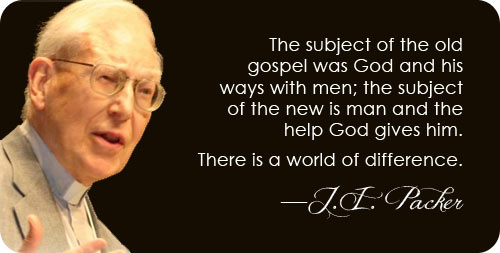I haven’t done a Wednesday Wisdom post in a very long time. And I don’t plan on picking it up regularly again, at least not for awhile. But, I heard this today and I just had to share it. It is so profound and describes our current Christian culture so well, that I had to revive Wednesday Wisdom, if just for this week!
This was shared in John MacArthur’s sermon Why We Believe the Bible is True. (By the way, this is the same sermon which I linked to in April’s Bible Challenge Newsletter.) He quotes J.I. Packer from his introduction for Puritan Theology. I hope that you will take the time to read this whole thing. It is so insightful and helps us to understand just exactly what is wrong with this modern day Christianity we find ourselves in.
J.I. Packer (as quoted by MacArthur) says this–
He said this. “It does not seem possible to deny that the Puritans were the strongest just where evangelical Christians today are the weakest. Here were men of outstanding intellectual power in whom the mental habits fostered by sober scholarship were linked with a flaming zeal for God and a minute acquaintance with the human heart. All their work reveals this unique fusion of gifts and graces. Where the Puritans called for order, discipline, depth and thoroughness, our temper is one of casual, haphazardness and restless impatience. “We crave for stunts, novelties and entertainments. We lost our taste for solid study, humble self-examination, disciplines, meditation and unspectacular hard work in our study.
“Again, where Puritanism had God and His glory as its unifying center, our thinking revolves around ourselves as if we were the hub of the universe.” And so he writes, “In evangelizing we preach the gospel without the Law and faith without repentance, stressing the gift of salvation and glossing over the cost of discipleship. No wonder so many professed conversions fall away. “And then,” he writes, “in teaching on the Christian life, our habit is to depict it as a path of thrilling feelings rather than of working faith and of supernatural interruptions, rather than of rational righteousness.
“And in dealing with the Christian experience, we dwell constantly on joy, peace, happiness, satisfaction and rest with no balancing reference to the divine discontent of Romans 7, the fight of faith in Psalm 73, or any of the burdens of responsibility and providential chastenings that fall to the lot of the child of God. The spontaneous jollity of the carefree extrovert comes to be equated with healthy Christian living, and jolly extroverts in our churches are encouraged to become complacent in carnality while saintly souls of less sanguine temperament are driven almost crazy because they cannot bubble over in the prescribed manner.” End quote.

